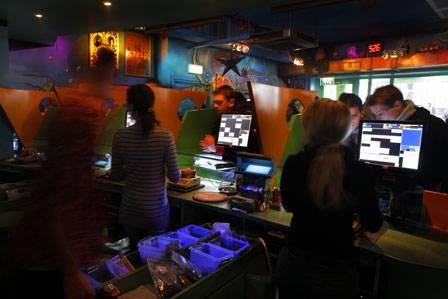The owner and several employees of the biggest coffee shop in the Netherlands are being prosecuted for membership of a criminal organisation.

The outcome of the trial can have a huge impact on soft drugs policy in the Netherlands. If Meddy Willemsen, the owner of the mega coffee shop Checkpoint in Terneuzen, is convicted of encouraging illegal hemp cultivation and running an organised supply chain, more proprietors of coffee shops could face prosecution as gang leaders.
‘Back door problem’
The announced move by the public prosecutor exposes the great paradox in the Dutch policy of tolerating the use of cannabis: so-called coffee shops are allowed to sell the soft drugs under certain conditions, but large-scale cultivation and buying bulk is illegal. Because of this anomaly in the system, hemp and hashish are allowed to leave the coffee shop through the front door – in quantities of no more than 5 grammes per person – but are not allowed to be delivered to the back door. This has been dubbed the ‘back door problem’.
The contradictory policy has recently come under fire from different sides of the political spectrum. Christian Democrat house leader Pieter van Geel is proposing to end the policy of tolerance towards soft drugs altogether; he wants all coffee shops in the country closed.
Van Geel’s proposal comes after the mayors of two towns on the Belgian border decided to shut down their coffee shops because of the nuisance from drug tourists . But mayors from other municipalities that have coffee shops (mostly bigger cities and towns on the German an Belgian borders) say it is time to properly regulate the wholesale supply of the stores.
‘A new given’
André Beckers, Checkpoint’s lawyer, calls the claim a test case.
“This process can have large consequences for the existing practise if the court follows the reasoning of the prosecutor,” Beckers says. “Every coffee shop owner knows that he has to abide by the rules, but the possibility of being prosecuted as a criminal gang leader if your stock exceeds 100 grammes of hemp is a new given.”
Coffee shops are permitted to stock up to 500 grammes on their premises, but in its heyday, Checkpoint, which is located close to the Belgian border, sold up to 10 kilogrammes of hemp every day. Checkpoint was closed after a police raid in May 2008, but up to then the coffee shop had served 3,000 customers per day. Willemse had 90 employees and, according to information in the prosecutor’s file, his turnover reached up to 600,000 euros per week. If Willemse is convicted, the 28 million euros he allegedly made between January 2006 and May 2008 could be branded as criminal assets.
Peter Tak, a professor of criminal law, says the chances of the court following the prosecution are “substantial”. According to Tak, everything a coffee shop does is illegal, but part of the business it tolerated. Nowhere in the Dutch ‘opium law’ does it say that it is allowed to sell drugs, let alone buy or produce it. Only as long as coffee shops abide by the regulations, will they avoid prosecution, says Tak.
The rules under which coffee shops can operate were drafted by the public prosecution itself. Apart from the maximum amount allowed for stock and sale, coffee shops cannot serve alcohol, sell hard drugs, advertise or allow people under 18 in their cafes. If these rules are broken, a mayor has the authority to shut down a specific coffee shop and the owner can be prosecuted. Tak: “I am surprised that the prosecutor hasn’t tried the criminal organisation claim before.”
Drugs tourists
But the court could also rule in favour of Willemse if it reasons that because the state accepts the sale of soft drugs, it can’t pretend not to know about the cultivation and transport of the hemp sold in the coffee shops.
In its 2007 coalition agreement, the Dutch government of Christian Democrats, Labour and ChristenUnie said it wanted to discourage coffee shops in the border areas, arguing that the tolerance policy is intended for local users, not for the – mostly Belgian and French – drugs tourists.
Cities close to the Belgian border have in the past tried different approaches to the nuisance of foreign drugs tourists. Maastricht tried to implement a system where only Dutch nationals were allowed to buy drugs, but a judge disallowed that. Bergen op Zoom and Roosendaal have shut down all eight of their coffee shops, while Eindhoven wants to create more of them, precisely to avoid the arrival of mega-coffee shops like Checkpoint in Terneuzen.
Source : nrc.nl